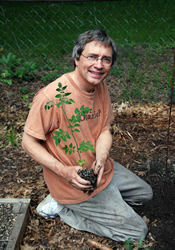
The Rev. Pat Watkins
COURTESY PAT WATKINS
Environmental stewardship by a faithful community
Watch as the 'Green Gym' athletes produce electricity while changing their lives
Watch and listen as Heather Bennett connects creation care and her faith
The Rev. Pat Watkins had always been concerned about caring for the Earth, but never understood how that related to his Christian faith. A missionary assignment in an isolated Nigerian village in the mid-1990s taught him to live far more simply and connected to the Earth. Upon returning to the United States, Watkins sought answers by studying the Bible and taking college classes in environmental science.
"We've always tried to live a pretty simple life — recycling, using as little electricity as possible, purchasing things locally," says Watkins, now serving with the United Methodist Council of Bishops as a missionary for Caretakers of God's Creation. What he realized "connected the way we lived with our faith."
More United Methodists and congregations are responding to God's call to be stewards of the Earth. This comes as scientists are learning how human behaviors are destroying the environment God created and we depend on.
The U.S. National Climate Assessment — released in May — reports that humans are responsible for global warming over the past 50 years, much of it due to fossil-fuel burning. That warming has raised average global temperatures more than 1.5 degrees Fahrenheit in the last century, with the most dramatic rising since the 1970s. The effects scientists cite include heavier precipitation, along with increased river and coastal flooding and more intense storms threatening communities and water supplies. Increased drought in other parts of the United States has resulted in dwindling groundwater supplies.
Heeding science in The United Methodist Church
In its May 13 "Faith in Action" online newsletter, the General Board of Church and Society called the climate assessment report "a sobering reminder of the impact overconsumption is having on God's good creation." Paired with the April report on global impact assessments from the United Nations' Intergovernmental Panel on Climate Change, the board said the assessment is a valuable resource for United Methodists seeking to address both effects and root causes of climate change.
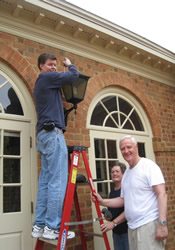
Installing compact flourescent bulbs in fixtures in and outside the church is one of the simpler ways congregations can practice good environmental stewardship.
COURTESY PAT WATKINS
The United Methodist Committee on Relief also noted how climate change is leading to severe disasters and creating refugees as people living in lowlands seek higher ground when sea levels and storm surges rise.
That is one of the "cool things about the report," Watkins says. It cites "some of the social aspects of climate change — it's not exclusively a science report. They talk about water resources, crop yields, food security, conflict," says Watkins. "It's becoming clearer that the people who are suffering the most are the poor — the ones who have had the least responsibility for climate change."
The General Board of Global Ministries is working to understand the interconnected issues and determine the most effective ways to respond.
"God's Renewed Creation: Call to Action and Hope," a 2009-letter and document from the Council of Bishops, calls the denomination to action in three areas: pandemic poverty and disease, environmental degradation and the proliferation of weapons and violence. The letter urges United Methodists to practice environmental and social holiness as they care for God's people and planet.
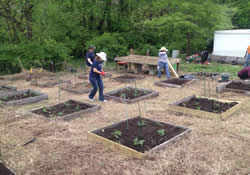
Volunteers work in the community garden at Bethlehem United Methodist Church, Franklin Tenn, where the Rev. Ryan Bennett is pastor.
COURTESY RYAN BENNETT
A Christian response
When the Rev. Ryan Bennett's wife, Heather, added recycling bins, compact fluorescent bulbs and other green solutions to the parsonage at Bethlehem United Methodist Church in Franklin, Tenn., he admits, "I didn't get the link between that and my faith." After reading more on the subject, Bennett realized "my faith in the Creator of the universe and my need to care for the creation ... fit together."
Bennett now serves on the board of Blessed Earth (www.blessedearth.org), an educational ministry that seeks to teach others how to tread lightly on the Earth.
Nancy Sleeth, who founded Blessed Earth with her husband Matthew, advocates simplicity and teaches "a biblically based sense of stewardship — being intentional about how we use our time and money.
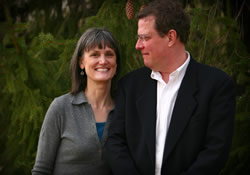
Nancy and Dr. Matthew Sleeth are founders of Blessed Earth.
COURTESY PHOTO
"Instead of spending time and investing in relationships with family, friends and God," she says, "we constantly try to fill the holes in our life with stuff. All that buying and consuming has a huge carbon footprint."
Loving God, loving creation
In Genesis 2, God entrusts humanity with stewardship of the Earth. Faithful disciples respond by working to keep land, air and water healthy and productive for future generations.
"One way of loving God is to be respectful of his creation," says Sleeth.
Bennett says Jesus' command to love God and neighbor includes protecting the food, air and water supply.
Centenary United Methodist Church in Salem, N.C., strives "to teach the difference between environmentalism and 'creation care' — the biblical perspective that we need to have within the church," says the Rev. Jonathan Brake. "Many of the results might be the same," he adds, "but the reason for what we're doing is grounded in our faith, rather than civic concerns."
Centenary, which replaced two boiler systems (saving tens of thousands of dollars through efficiency), will consult with the U.S. Green Building Council on construction of a new, three-story children's building.
United Methodists can renew their connection to creation by staying aware of the natural world and seeking renewal in it, explains retired Bishop Timothy W. Whitaker, an author of "God's Renewed Creation." This relationship will help United Methodists "find the motivation and perspective we need to address the very difficult and long-term challenges of being stewards of the Earth," he says.
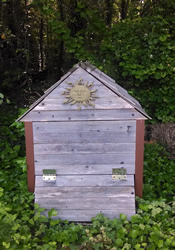
This compost center on one church's property provides the fertilizer for the community garden.
COURTESY PAT WATKINS
Such stewardship will attract others, Bennett says. "If we could show [young people] that the root of caring is a biblical mandate, then we could share with them that there is relevance within the church again, and we'd have the opportunity to share hope through Jesus with them, too."
Cultivating change
United Methodist churches approach environmental stewardship in different ways. Many offer small-group studies of the theology behind creation caretaking. "To me, that's one of the most important things they can do — to connect caring for Earth with being a disciple of Jesus Christ, and integrate it into the total life of the church," Watkins says.
Creation care teams spearhead changes ranging from heating, ventilation and air conditioning tune-ups that save thousands of dollars to swapping disposable tableware for washable plates and reusable cups. Churches are updating windows, using weather stripping, composting food waste, replacing inefficient lights and more. A few have funded solar panels.
Many churches cultivate community gardens, offering the harvest to food banks or inviting the larger community to participate. "Gardening is one of the best things that churches are doing," Watkins says. "It connects caring for the Earth with the traditional mission of feeding the hungry."
Making a difference
As churches take stewardship seriously, they make a difference.
"I think the [global] church probably will be the most effective organization to make changes," Watkins says. "It's not just that 'we can do a little something' — I think the church could find itself in a unique position of being able to solve problems."
Carrie Madren is a freelance writer based in Glen Elyn, W. Va.
Recognizing eco-stewardship
Cool Congregations, a stewardship program of Interfaith Power & Light www.interfaithpowerandlight.org, recognizes congregations that increase energy efficiency and conservation.
United Methodist churches that have earned honors include Wildwood in Chittenden, Vt., which created a raised garden to grow vegetables that are available to anyone in the community who needs fresh food, and Brackett Memorial in Peaks Island, Maine, which helped the community build 900 energy-efficient storm windows for island residents in collaboration with the nonprofit Window Dressers. Brackett Memorial also made energy-efficient improvements to its sanctuary and fellowship hall, including rewrapping heating ducts with thick foil-faced insulation, applying foam to foundation walls, and more — measures that will save close to 20 percent annually on heating bills, according to church member Sam Saltonstall.
